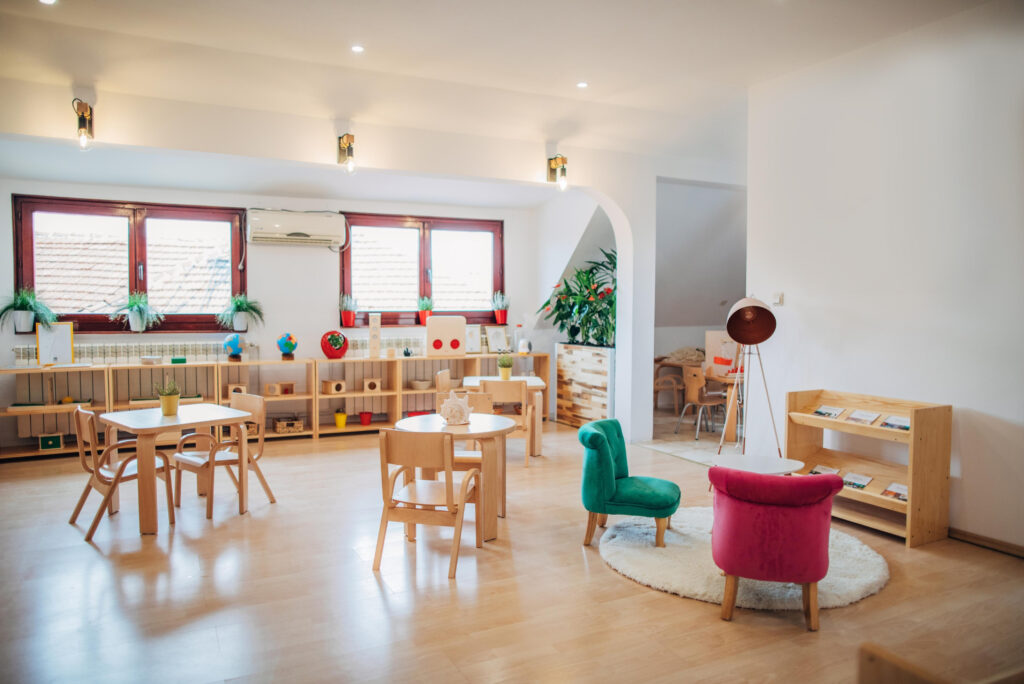Children's Services
Ultimate Guide
To Childcare Options In The UK

General Childcare Options

Childcare in the UK covers a wide spectrum of services designed to meet the needs of families with children of different ages. Parents often explore nurseries, day care centres, home-based care and babysitting to find what best suits their circumstances. Each option offers distinct advantages and limitations, and understanding these helps parents make informed decisions.
Nurseries are structured environments where children are cared for by qualified staff in dedicated premises. They typically accept children from infancy through to school age and follow the Early Years Foundation Stage framework to support development. Day care centres often serve a similar role but can vary in scale and structure, sometimes being larger facilities catering to multiple age groups.
Home daycare, sometimes known as childminding, involves care provided in a carer’s home. This option may be more flexible and homely, appealing to families who prefer a smaller group setting. Babysitting is less formal and usually arranged for shorter periods, often in the child’s own home. While babysitting may not always provide the same structured development opportunities, it can be a convenient and flexible solution.
Crèche facilities are often located in workplaces, gyms, or shopping centres, offering short-term childcare while parents are on site. Emergency childcare services provide coverage at short notice, often filling gaps caused by illness, work commitments or unexpected events. Parents selecting any of these options are advised to check qualifications, safety standards, and regulatory compliance to ensure their child’s wellbeing.

Finding Childcare Near Me
The phrase “near me” has become central to online searches for childcare, reflecting the importance of convenience and location. Parents often look for nurseries, day care centres, and babysitting services in close proximity to their home or workplace to simplify drop-off and pick-up routines.
Online childcare directories and comparison websites provide tools to filter providers by location, price, and rating. Many parents rely on reviews and recommendations from other families to assess the quality of local options. When searching for nurseries near me or infant care near me, parents often focus on safety, staff qualifications and availability of places.
Affordability is another key factor, leading to searches such as affordable daycares near me. Many families also explore government-funded childcare centres that may offer free or subsidised places for children of certain ages. Emergency and drop-in childcare services are also often searched locally, as parents need solutions that are accessible at short notice.

Finding childcare close to home or work offers practical benefits, but parents are also encouraged to visit facilities, meet staff, and review inspection reports before making final choices. Location may be the starting point, but quality and suitability remain essential considerations.





Nursery and Day Care Centres
Nurseries and day care centres are two of the most widely used childcare options in the UK. They provide structured, professional care for young children, often from a few months old until school age. Both are typically staffed by trained early years professionals and operate within national regulations.
The difference between a nursery and a day care centre is not always clear, as the terms are often used interchangeably. Nurseries tend to have an educational focus, following the Early Years Foundation Stage framework to prepare children for primary school. Day care centres may be more varied, with some offering extended hours or specialised programmes.
Parents often search for the best daycare centres in their area, looking for high standards of care, good staff-to-child ratios, and facilities that promote learning and play. Safety is a major concern, particularly for infants and toddlers. Many nurseries provide meals, snacks, and structured daily routines that support healthy development.
When visiting a nursery or day care centre, parents are advised to observe cleanliness, safety measures, staff interaction with children, and the general atmosphere. High-quality nurseries and day care centres not only provide supervision but also foster social, emotional, and cognitive growth.
Babysitting Services
Babysitting is a flexible childcare option that typically involves looking after children in their own home for short periods. It is often used for evenings, weekends, or irregular schedules. Parents seek reliable babysitting services to ensure their children are safe and comfortable while they are away.
Babysitters can range from informal arrangements with family friends to professional services booked through agencies or websites. The difference between a babysitter and a nanny is usually the level of commitment and formality. Nannies often provide regular, long-term care, sometimes living with the family, whereas babysitters are usually engaged for occasional work.
Parents commonly ask about how much to pay for babysitting per hour in the UK. Rates vary by region, experience, and the number of children being cared for. Safety remains a top priority, with background checks, references, and qualifications providing reassurance. Babysitting websites often act as intermediaries, matching families with vetted carers.
Babysitting services can sometimes extend to overnight care or short-term emergency cover, though availability may be limited. Parents should communicate clearly about expectations, routines, and emergency contacts to ensure the arrangement works smoothly.


Emergency and Drop-In Childcare
Emergency childcare provides families with rapid access to childcare when unforeseen circumstances arise. This might include illness of a usual carer, sudden work commitments, or unexpected personal situations. Drop-in childcare is similar but often planned in advance for short periods, allowing parents flexibility.
Many nurseries and day care centres now offer emergency or drop-in places, although availability can be limited. Parents may also use agencies that specialise in arranging short-notice childcare, connecting families with qualified carers.
Safety and suitability are important when using emergency services. Parents are encouraged to verify that staff have appropriate qualifications and that the environment meets required standards. Costs for emergency childcare are usually higher than regular arrangements due to the convenience and flexibility offered.

Drop-in childcare centres are often used by parents who need a few hours of care while attending appointments, work, or other commitments. They usually accept a wide age range but policies can differ. The main advantage is the ability to access care without long-term contracts or commitments.





Infant and Early Years Care
Caring for infants and toddlers requires specialised skills and facilities. Parents of very young children often look for infant care near me to find providers experienced in looking after babies under two years old.
Nurseries typically accept children from around three months of age, although policies vary. Infant care often involves ensuring safe sleeping arrangements, appropriate feeding practices, and close attention to hygiene. The ideal child-to-carer ratio is lower for infants to ensure they receive sufficient individual attention.
Parents often ask whether nurseries are safe for babies under two or how to transition a child from home to nursery care. Staff qualifications and training are crucial in this context, with many parents seeking reassurance that carers are experienced in infant development and first aid.
Toddler care builds on this foundation by encouraging early socialisation, structured play, and routines that prepare children for later learning. Infant and early years care also supports parents by giving them confidence that their children are safe, nurtured, and developing appropriately.
Nursery Costs and Funding
The cost of childcare is one of the most significant considerations for parents. Fees can vary widely depending on location, type of service, and the child’s age. Parents often search specifically for nursery costs for 2 year olds as this is a common age to enter formal childcare.
Government schemes in the UK provide some financial support. Eligible families can access funded hours of childcare for 2, 3 and 4 year olds. Tax-free childcare and universal credit childcare payments are also available to assist with costs. Parents may also find affordable daycares near me through local authority websites or childcare comparison platforms.
Nurseries sometimes offer discounts for siblings or extended bookings, but costs can still represent a large portion of household budgets. Emergency and drop-in childcare services are usually more expensive per hour due to their flexibility.
Understanding funding options is essential. Parents are encouraged to research eligibility for free hours, apply for schemes through government portals, and discuss fees directly with providers. Transparency on costs helps families plan effectively.






Quality and Safety in Childcare
Quality and safety are critical when choosing childcare. In the UK, Ofsted regulates and inspects nurseries, day care centres, and childminders. Parents can check inspection reports online to see ratings and comments about standards.
A high-quality childcare provider will have clear safety measures, trained staff, and suitable facilities. Parents often ask about the ideal staff-to-child ratio, which varies by age group but ensures children receive proper attention. Safety procedures around allergies, dietary needs, and health emergencies are also vital.
Babysitting services may not always be regulated in the same way, so background checks, references, and personal recommendations are important. Agencies often carry out vetting to provide reassurance.
For crèche facilities and home daycare, inspections and registration help maintain standards. Parents should feel confident asking providers about training, qualifications, and safeguarding policies. Quality care not only protects children but also supports their wellbeing and development.
Child Development and Learning
Childcare is not just about supervision but also about supporting learning and development. Nurseries and day care centres in the UK are required to follow the Early Years Foundation Stage framework. This promotes physical, emotional, social, and cognitive growth.
Parents often want to know how nurseries prepare children for school. Activities include structured play, early literacy and numeracy, and opportunities for social interaction. Staff track development progress and work with parents to address any concerns.
Play is central to early years learning, providing opportunities for exploration and creativity. Some nurseries and day care centres also offer additional programmes such as language classes or specialised activities.
Babysitting may not always provide structured learning, but some sitters help with homework or reading. Nurseries also play a role in supporting children with special educational needs, working with parents and external professionals. High-quality childcare helps children build skills and confidence for future learning.

Choosing the Best Childcare
Selecting the right childcare provider is one of the most important decisions parents make. With so many options available, from nurseries to babysitting, the process can feel overwhelming.
Parents often rely on reviews, recommendations, and inspection reports when narrowing down choices. Visiting a nursery or day care centre is essential to assess cleanliness, staff interaction, and the overall environment. Asking questions about routines, safety procedures, and qualifications provides additional reassurance.
Some families must balance budget with quality, making affordable options a priority. Others may focus on flexibility, such as providers offering extended hours or emergency care. Parents working full-time often seek reliable solutions that integrate with their schedules.
Childcare websites and directories make comparison easier, but the final decision usually comes down to personal visits and instinct. Choosing the best childcare involves weighing location, cost, quality, and compatibility with the family’s needs.

